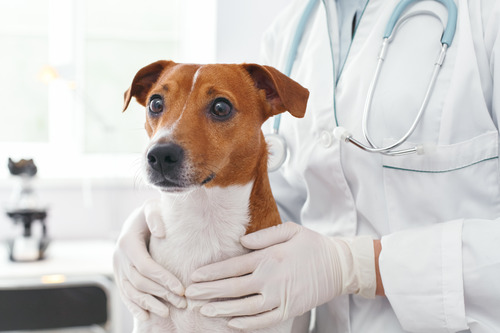Pneumonia in dogs is a serious health condition that affects the respiratory system, causing inflammation and accumulation of fluid in the lungs. It can be triggered by a variety of factors, including viral, bacterial, or fungal infections, as well as by aspirating food or other substances into the lungs. Recognizing the signs and understanding the treatment options are vital for ensuring the well-being of your dog. If you notice any symptoms of respiratory distress in your pet, it’s essential to seek veterinary care immediately. The team at North Jersey Animal Hospital is ready to provide expert care. Call us at (973) 595-8600 or request an appointment online.
Signs and Symptoms of Pneumonia in Dogs
The early detection of pneumonia in dogs is crucial for prompt treatment. Common symptoms include:
- Persistent coughing
- Difficulty breathing or rapid breathing
- Nasal discharge
- Fever
- Lethargy or decreased energy levels
- Loss of appetite
If your dog shows any of these symptoms, it’s important to contact North Jersey Animal Hospital as soon as possible. Timely veterinary intervention can make a significant difference in the outcome of the treatment.
Causes of Pneumonia in Dogs
Pneumonia in dogs can be caused by a variety of pathogens or by aspiration (inhaling foreign material). The primary types are:
Bacterial Pneumonia
This is the most common form and is caused by bacteria such as Streptococcus, Mycoplasma, or Bordetella. Bacterial pneumonia often requires antibiotics for treatment, which must be prescribed by a veterinarian.
Viral Pneumonia
Viruses like the canine influenza virus or the canine distemper virus can also lead to pneumonia. These cases can be more complex, as they might predispose dogs to secondary bacterial infections.
Aspiration Pneumonia
Aspiration pneumonia occurs when a dog inhales food, vomit, or other foreign materials into the lungs, leading to infection and inflammation. This type is particularly concerning and requires immediate veterinary attention.
Diagnosis and Treatment of Pneumonia in Dogs
Diagnostic Procedures
Accurate diagnosis of pneumonia is achieved through a combination of clinical examination, history, and diagnostic tests, including:
- Chest X-rays
- Blood tests
- Sputum culture
These tests help determine the type of pneumonia, which is crucial for effective treatment.
Treatment Options
Treatment for pneumonia in dogs typically involves:
- Antibiotics for bacterial infections
- Supportive care, such as fluids and oxygen therapy
- Medication to control symptoms like coughing and fever
- Monitoring in severe cases
The veterinary team at North Jersey Animal Hospital is equipped with the tools and expertise to treat pneumonia in dogs. Remember, early treatment is essential to help your dog recover quickly.
Preventing Pneumonia in Dogs
Keeping your dog healthy and preventing pneumonia can often be achieved by following a few simple steps:
- Regular vaccinations
- Good hygiene and cleanliness practices
- Proper diet and exercise to maintain a strong immune system
- Avoiding exposure to known pathogens or sick animals
Additionally, for breeds prone to aspiration, careful feeding practices are important to prevent food or objects from being inhaled into the lungs.
When to Contact a Veterinarian
If you suspect your dog has pneumonia, or if they are displaying any symptoms of respiratory distress, do not wait. Contact North Jersey Animal Hospital immediately at (973) 595-8600 or schedule an appointment online. Our veterinary team is here to ensure your dog receives prompt and effective care to manage this serious condition.
Caring for Dogs with Pneumonia
Pneumonia in dogs can be a daunting issue, but with early detection and proper medical attention, many dogs recover well. Our team at North Jersey Animal Hospital is committed to providing compassionate and competent care to help your dog breathe easier and return to their normal, playful selves.





